Talos IV
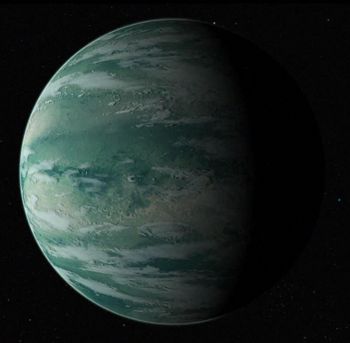
Talos IV (TOS-00)
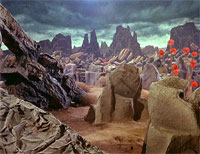
Talos IV surface (TOS-00)
The fourth planet in the Talos Star Group and homeworld of the Talosians, Talos IV, a Class-M world, had an Oxygen-Nitrogen atmosphere that, according to U.S.S. Enterprise NCC-1701 science officer Lieutenant Spock, was “[h]eavy with inert elements, but well within safety limits; Gravity 0.9 g; barren surface with little vegetation.” One blue-leafed plant caused a high-pitched humming noise from its vibrations, which had a pleasant effect on humanoids when touched, even eliciting a smile from Spock. According to Captain Pike, Earth was “in the stellar group at the other end of this galaxy.” The planet’s surface was decimated “thousands of centuries ago,” according to Vina, in a nuclear war among the Talosians, who all but destroyed themselves in the process.[1]
References
- 1. “The Cage.” Star Trek, Episode 00. Television. 1965 (Unaired).
Talos Star Group
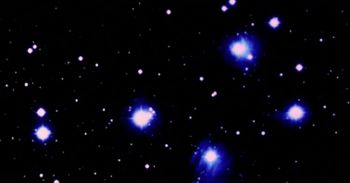
Talos Star Group (TOS-00)
No ships or Earth colonies had traveled as far out as the Talos Star Group when the U.S.S. Enterprise NCC-1701 arrived there[1] in 2254,[2] so it had never been explored. At least one system in the group was superficially similar to the Sol System, with eleven planets; the fourth was determined to be Class-M. According to Enterprise Captain Pike, Earth was in “the stellar group at the other end of this galaxy.”[1]
References
- 1. “The Cage.” Star Trek, Episode 00. Television. 1965 (Unaired).
- 2. Star Trek: Star Charts. Book. 2002. Pocket Books.
Suraya Bay
A popular Risan vacation spot, which featured villas built into the cliffs overlooking the ocean. Captain Archer looked forward to staying there for his shore leave in 2152.[1, 2]
References
Suliban Helix
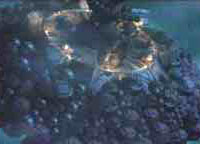
Suliban Helix (ENT-01-02)
Massive Suliban facility made up of hundreds of smaller, interlocked cell ships. The Helix was a spiral-shaped station, and individual ships could engage and disengage without harming the overall structure. The Helix contained the Temporal Chamber where the Suliban could communicate with a contact from the future. In 2151, Captain Archer and Trip Tucker infiltrated the Helix and freed the Klingon courier Klaang.[1]
References
Subquadrants
Quadrants were divided into numbered Subquadrants and Sector Zones. The intersection of a subquadrant and a sector zone resulted in a roughly cube-shaped Sector Grid, which was 5000 light years long and 3600 light years high along the galactic plane; the width varied by distance from the galactic core—at the rim, it could be as wide as 8727 light years. Each sector grid was then divided into a cubic grid of 100 Sector Quads, which were then further broken down into 900 ore more roughly cubical Sector Blocks, each measuring nearly 100 cubic light years (varying by distance from the galactic core). Finally, sector blocks were divided into 100 sectors, each measuring 20 cubic light years.Sector numbers were a nine-digit sequence with the first two digits representing the sector grid, the first digit of which represented the subquadrant and the second the sector zone (e.g. Sector Grid 15 was the intersection of subquadrant 1 and sector zone 5); the next two digits represented the sector quad; the next three digits represented the sector block; and the final two digits represented the sector proper.[1]
References
Starbase Corinth IV
In 2266, the U.S.S. Enterprise NCC-1701 was scheduled to visit Starbase Corinth IV, where Commodore Jose Dominguez eagerly awaited an “urgent” delivery of Mexican red chili peppers from his friend, Captain James T. Kirk.[1]
References
Starbase 9

Starbase 9 (TOS DC v2 73)
Originally a supply station constructed in the 2180s, Starbase 9 slowly became a major scientific and astronomical monitoring station — the Argus Array, for example, was designed as an “uprated” model of Starbase 9’s orbital phased EM collectors.[2]
The U.S.S. Stargazer NCC-2893 was towed to this starbase after the U.S.S. Enterprise NCC-1701-D received the old vessel from the Ferengi in 2364.[1]
References
- 1. “The Battle.” Star Trek: The Next Generation, Episode 110. Television. 16 November 1987.
- 2. “Starfleet Operations Manual.” Star Trek Roleplaying Game, Book 3. Game. 2003. Decipher, Inc.
Stameris
Planet known for its slave market in the mid-22nd century. Ulis and his Ferengi crew planned to sell the female crewmembers of the Enterprise NX-01 at a slave market on this planet.[1]
References
Sol System
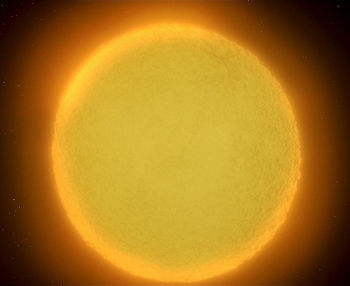
Sol (ST-04)
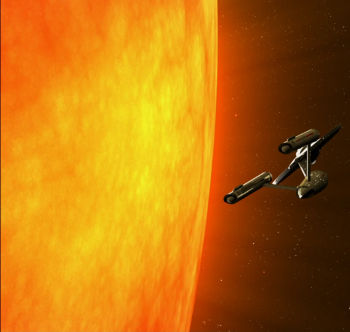
Sol (TOS-21)
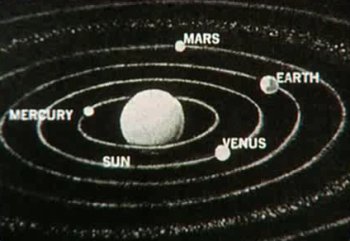
Sol System (TOS-00)
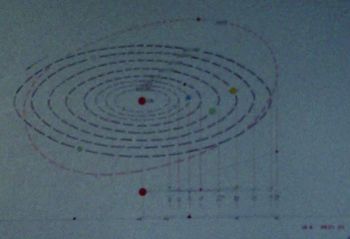
Sol System (TOS-37)
Star system located in Sector 001, in the Alpha Quadrant. The parent star, Sol, was Type-G and was orbited by eight planets (though Pluto frequently switched between being considered a planet and a planetoid),[2] including Earth, and was commonly known as the Sun. The Talosians viewed an image of the Sol System and many images of Earth’s history while accessing the U.S.S. Enterprise NCC-1701‘s computer in 2254.[1]
Planets
References
- 1. “The Cage.” Star Trek, Episode 0. Television. 1965 (Unaired).
- 2. “Before Dishonor.” Star Trek: The Next Generation. Novel (Unnumbered). November 2007.
Sector Zones
Quadrants were divided into numbered Subquadrants and Sector Zones. The intersection of a subquadrant and a sector zone resulted in a roughly cube-shaped Sector Grid, which was 5000 light years long and 3600 light years high along the galactic plane; the width varied by distance from the galactic core—at the rim, it could be as wide as 8727 light years. Each sector grid was then divided into a cubic grid of 100 Sector Quads, which were then further broken down into 900 ore more roughly cubical Sector Blocks, each measuring nearly 100 cubic light years (varying by distance from the galactic core). Finally, sector blocks were divided into 100 sectors, each measuring 20 cubic light years.Sector numbers were a nine-digit sequence with the first two digits representing the sector grid, the first digit of which represented the subquadrant and the second the sector zone (e.g. Sector Grid 15 was the intersection of subquadrant 1 and sector zone 5); the next two digits represented the sector quad; the next three digits represented the sector block; and the final two digits represented the sector proper.[1]
References
Categories
- Animated Series (60)
- Articles (28)
- Books (447)
- Cast & Crew (79)
- Comics (22)
- DS9 (328)
- Early Voyages (125)
- Education (5)
- Enterprise (373)
- Excelsior (36)
- Food (19)
- Games (223)
- Klingon (70)
- Library (1,543)
- Logs (593)
- Lost Era (55)
- Medicine (18)
- Merrimac (1)
- Mirror (35)
- Miscellaneous (13)
- New Frontier (54)
- Next Generation (635)
- Original Series (681)
- Personnel (436)
- Places (369)
- Politics (12)
- Recreation (10)
- SCE (41)
- Science (1)
- Shatnerverse (9)
- Ships (455)
- Site Updates (98)
- Starfleet Academy (86)
- Stargazer (42)
- STO (61)
- Technology (45)
- Titan (59)
- To Boldly Go (1)
- TV/Film (214)
- Uncategorized (4)
- Vanguard (76)
- Voyager (236)
- Weapons (27)
- Xenology (54)